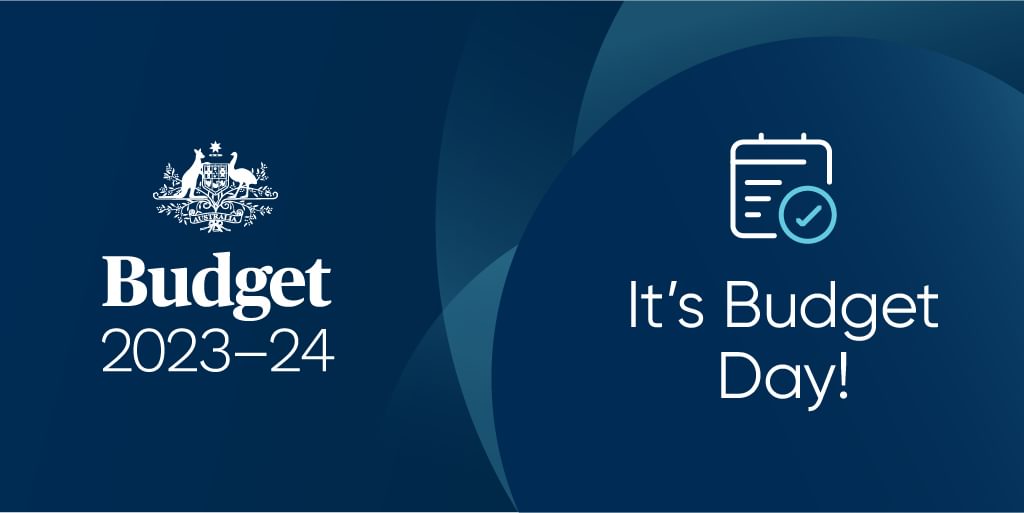
On Tuesday night, 9 May 2023, Federal Treasurer Jim Chalmers handed down his second Federal Budget for the Labor Government. According to the Budget papers, the Budget has returned “into the black”, delivering a surplus for the first time in 15 years. Our country’s financial position has benefited from high commodity prices and a stronger than expected jobs market. Similar to last year, the Treasurer has cast the Budget with aims to provide cost of living relief whilst not placing additional pressure on inflation.
Some wins from the Budget will be for those eligible for the Government’s energy relief package. High income earners are also winners with no mention of changing or removing the stage 3 income tax cuts legislated to come into effect on 1 July 2024.
Those not so happy with the budget will be middle income earners who lost the low and middle income tax offset (LMITO) in the October 2022 budget and who are ineligible to share in most of the incentive packages announced in this budget.
The Treasurer warned of more “difficult decisions” to come. Hopefully those difficult decisions are answered from a position of fiscal responsibility and not just a politically motivated standpoint. Difficult decisions do need to be made around a well-rounded, broad tax revenue base in years to come.
We’ve outlined below some of the measures that were announced in the Budget that will impact on our clients. As with all budgetary measures, these measures are not final until the relevant legislation has been passed by the Government. We will keep you updated on the status of any proposed measures.
Income tax measures
The previously legislated stage 3 tax cuts for individuals starting 1 July 2024 remain untouched.
There was no extension announced to the low and middle income tax offset (LMITO) beyond the 2021-22 year. As such, the LMITO has now ceased. Consequently, low-to-middle income earnigns (incomes up to $90,000 but phasing out up to $126,000) will see their refunds reduced between $675 and $1,500 from the 2023 year onwards.
The Medicare Levy low-income thresholds will marginally increase from 1 July 2022 (which increases the point from which the Medicare Levy will start to apply).
Business measures
The Budget contained a few measures to help small businesses:
Instant asset write-off threshold increased to $20,000
From 1 July 2023, the instant asset write-off threshold was due to reduce to $1,000. This budget measure has increased this threshold to $20,000 for businesses with an aggregated turnover of less than $10 million. The increased threshold will apply until 30 June 2024.
Assets acquired for more than $20,000 can continue to be placed into the small business simplified depreciation pool and depreciated at 15% in the first year and 30% thereafter.
Small Business Energy Incentive
Small businesses with a turnover of less than $50 million can deduct an additional 20% of the cost of eligible depreciating assets that promote greater energy efficiency.
A range of depreciating assets will be eligible for the incentive (including energy efficient fridges, heat pumps and electric heating or cooling systems, batteries and thermal energy stores). The assets will need to be first used (or installed ready for use) between 1 July 2023 and 30 June 2024.
Up to $100,000 of total expenditure will be eligible for the incentive (which will provide a maximum bonus deduction of $20,000).
Energy Price Relief Plan
Small businesses customers of electricity retailers will benefit from $1.5 billion in funding that the Government has committed to provide energy bill relief.
Payday Super
From 1 July 2026 employers will be required to pay their employees’ super guarantee at the same time as their salary and wages.
Help to manage tax instalments
The GDP adjustment factor for PAYG tax instalments and GST instalments will be 6% for the 2023-24 financial year (down from 12% under the statutory formula).
Startup support
$431.9 million is being provided over 4 years to support small and medium businesses and startups to commercialise their ideas and grow their operations. This funding will be targeted at businesses operating in the priority areas of the National Reconstruction Fund.
Register of beneficial ownership
$1.9 million provided to establish a public register of beneficial ownership of companies and other legal vehicles (including trusts).
Expanded ATO Compliance Programs
Funding is being provided to extend several ATO compliance programs.
Personal Income Tax Compliance Program
$90.2 million will be provided to the ATO and Treasury to extend the Personal Income Tax Compliance Program for 2 years from 1 July 2025 and to expand the scope from 1 July 2023. This enables the ATO to continue to deliver a combination of proactive, preventative and corrective activities in key areas of non-compliance, including over-claiming of deductions and incorrect reporting of income.
GST compliance
$588.8 million will be provided to the ATO from 1 July 2023 for the ATO to continue a range of activities that promote GST compliance.
Debt collection
Additional funding will be provided to the ATO to facilitate engagement with taxpayers who have high-value debts over $100,000 and aged debt older than 2 years.
Lodgement penalty amnesty
Small businesses with an aggregated turnover of less than $10 million will have failure to lodge penalties remitted for outstanding tax statements lodged between 1 June 2023 and 31 December 2023 (where those statements were originally due between 1 December 2019 and 29 February 2022). This is designed to encourage small business owners to re-engage with the tax system.
Superannuation guarantee compliance
$40.2 million provided to the ATO in the 2023-24 year to assist with enforcing superannuation guarantee compliance. The ATO will continue to use data matching to identify superannuation guarantee underpayment.
Superannuation
Tax changes for super account balances above $3 million
The Government confirmed their commitment to increasing the tax rate for earnings on superannuation accounts in excess of $3 million from 1 July 2025. Earnings that correspond to the proportion of an individual’s superannuation balance over $3 million will be taxed at 30%. Earnings that relate to assets below the $3 million threshold will continue to be taxed at 15% (or 0% if held in a retirement pension account).
Other measures of interest
Some other measures of interest include:
- Increase to certain government payments
- The base rate of the working age and student payments will increase by $40 per fortnight from 20 September 2023 (this applies to JobSeeker, Youth Allowance, Parenting Payment, Austudy, ABSTUDY, Disability support pension, special benefit).
- The maximum rates of Commonwealth Rent Assistance allowance will increase by 15%.
- Parenting Payment (single) will be extended to single principal carers with a young child under 14 years of age (currently, the payment only supports single principal carers with a child under 8 years of age).
- Household Energy Upgrades
- $1.3 billion in funding is being provided to establish the Household Energy Upgrades Fund which will provide low-cost finance and mortgages (in partnership with private institutions) for home upgrades to save energy.
- Childcare
- $72.4 million in funding over 5 years to support the Early Childhood Education and Care sector to build and retain their workforce.
- Aged Care
- From 30 June 2023, there will be a 15% increase to the award wages for many aged care workers.
- Over $1.1 billion provided to improve the in-home aged care system and the delivery of aged care services.
We will keep you up-to-date with the progress of the implementation of these Budget measures.
If you would like to discuss the tax implications of the budget proposals, please call us on (07) 56656469.
DISCLAIMER: The information in this article is general in nature and is not a substitute for professional advice. Accordingly, neither TJN Accountants nor any member or employee of TJN Accountants accepts any responsibility for any loss, however caused, as a result of reliance on this general information. We recommend that our formal advice be sought before acting in any of the areas. The article is issued as a helpful guide to clients and for their private information. Therefore it should be regarded as confidential and not be made available to any person without our consent.

Jeanette has over 20 years experience as an accountant in public practice. She is a Chartered Accountant, registered tax agent and accredited SMSF Association advisor. When she is not helping business owners grow their empires, you will likely find her out running on the trails or at the gym. Book in to see Jeanette today.



